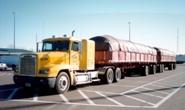Prices

October 14, 2014
Rail Congestion Forces Cliffs to Utilize Trucks
Written by Sandy Williams
Cliffs Natural Resources will begin using trucks to transport taconite pellets to the docks from its Minnesota facility due to rail congestion in the upper Midwest.
In an announcement on Friday, the company said it will immediately begin utilizing 100 trucks per day to ship iron ore pellets from Hibbing Taconite to the Duluth-Superior harbor in an effort to reduce its backlog of pellets and move as much taconite as possible before the Great Lakes shipping season closes in mid-January.
“This action will ensure (our) steelmaking customers on the lower Great Lakes will have an adequate supply of pellets to maintain steelmaking operations,” Cliffs said in a news release. “While efforts are underway to secure improved rail service and address the backlog of pellets at Hibbing Taconite and other taconite operations affected by rail service problems, Cliffs needs to take immediate steps to fulfill its commitment to supply iron ore pellets to its customers.”
Cliffs chairman, president and CEO Lourenco Goncalves expects the truck deliveries to continue for two months and calls it a “short-term solution” and asked communities along the truck route for their patience.
US Steel’s Keetac operation and ArcelorMitttal’s Minorca mine have also begun shipping taconite to Duluth harbor by truck.
Stockpipes of taconite pellets from Iron Range mines were estimated at more than 2 million tons due to poor rail service, according to Sen. Amy Klobuchar (D-Minnesota) at a Senate Commerce, Science & Transportation Committee hearing last month.
Cliffs, along with other rail customers including farmers and power plants, are seeing rail delays that are blamed on the increasing shipments of oil from North Dakota. At a September 30 meeting of legislators in Minnesota, a variety industries within and surrounding the state attested to the growing problem with rail delays.
Although the oil industry has been targeted as the cause for congestion, Brian Sweeney of BNSF Railway Co., which services the area, says the perception that the railway is prioritizing oil shipments is untrue and that oil companies are also dissatisfied with BNSF due to shipping delays.
The increased demand for rail cars has also inflated leasing prices. According to Rep. Patti Fritz (D-Faribult), farmers are reporting rail car prices in recent months have soared from $750 to more than $4000.
Power companies say that rail is the cheapest and most efficient way to move coal and alternative methods will drive up costs for consumers.
BSNF says it is adding nearly 350 employees in Minnesota and buying more locomotives but it is finding it difficult to keep up with the increased shipping demand. Over the next three years, billions of dollars of projects are planned, along with a second track in Minnesota. New tracks are also needed in North Dakota to keep up with oil demand.
“All of the solutions are several years out,” said Dave Christianson of the Minnesota Department of Transportation.







